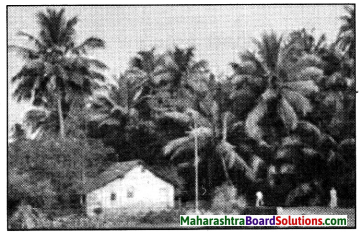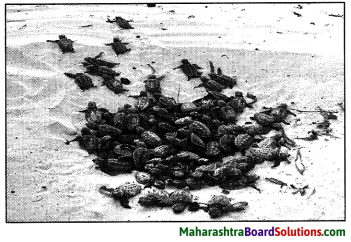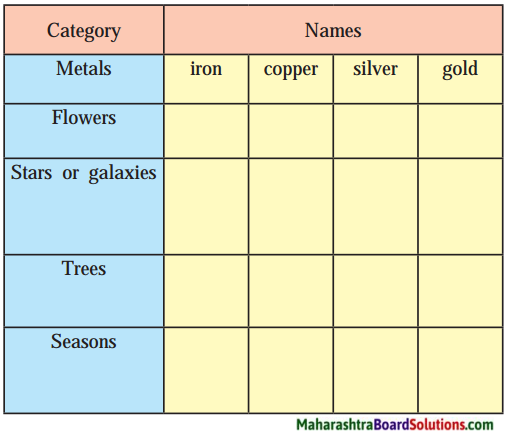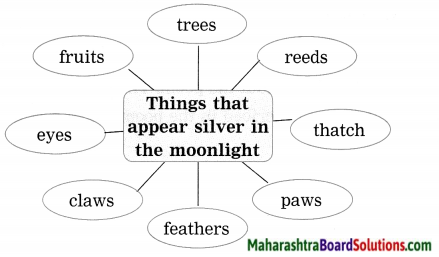Class 9 English Chapter 3.4 Question Answer Maharashtra Board
Balbharti Maharashtra State Board Class 9 English Solutions My English Coursebook Chapter 3.4 Think Before You Speak! Notes, Textbook Exercise Important Questions and Answers.
Think Before You Speak! Poem 9th Std Question Answer
My English Coursebook Std 9 Guide Chapter 3.4 Think Before You Speak! Textbook Questions and Answers
Warming up:
Chit-chat
- Do you write a diary?
- Do you write letters or notes to your friends and relatives?
- Do you ever fight with your friends?
- Do you have arguments with your family members?
- What are the arguments about?
![]()
Read the following words which may be used in place of speak-

Question (a)
Tick the words you know and underline the ones that you do not know. Find their meaning and pronunciation from a good dictionary.
1. Which of these words have a positive meaning?
2. Which of these words suggest an unpleasant context?
Question (b)
Try to translate these words into your mother tongue to show the different shades of meaning.
English Workshop:
1. The same word can be used as a noun in some sentences and as a verb in others.
Question 1.
The same word can be used as a noun in some sentences and as a verb in others.
For example,
1. Many are the empty remarks. ………………. (Noun)
2. A wise man once remarked, …………………. (Verb)
Make two sentences of your own with each of the words given below, using the same word as a noun in one and as a verb in another:
![]()
Question (a)
Change:
Answer:
1. He experienced a big change in his life. (Noun)
2. She changed her mind and joined them. (Verb)
Question (b)
Show:
Answer:
1. The young boy hosted the television show. (Noun)
2. They showed us the way to the post office. (Verb)
Question (c)
throw:
1. The naughty boy throws stones at a dog. (verb)
2. The wicketkeeper could not catch the throw properly, (noun)
Question (d)
return:
1. He will return from Pune soon. (verb)
2. I shall meet him on his return from London.(noun)
Question (e)
benefit:
1. He invests money in the mutual fund so that he will be benefitted in future, (verb)
2. He is enjoying the benefits of his hard work and honesty, (noun)
2. Complete the following:
Question 1.
Complete the following:
(a) Our ears are like funnels because ………………….
(b) The two rows of teeth are like a fence because ………………
(c) The two lips are like a fence because ……………..
(d) Harsh words are like scattered bits of paper carried away by the wind because ………………..
Answer:
(a) Our ears are like funnels because there is no door with which you can close them.
(b) The two rows of teeth are like a fence because every word you speak must pass through this wall of teeth.
(c) The two lips are like a fence because before a word can be spoken, it has to pass, it has to pierce through these two w alls.
(d) Once you have spoken a word you cannot get it back.
![]()
3. Write a brief summary of the story of the young man and his spiritual teacher, making the young man the narrator:
Question 1.
Write a brief summary of the story of the young man and his spiritual teacher, making the young man the narrator:
You may begin as given below. ‘I went quickly to my spiritual teacher for advice
because I had ……………… (Now continue)
Answer:
The young man and his spiritual teacher I went quickly to my spiritual teacher for advice because I had hurt my friend with my harsh and unkind words. I wanted to make amends. My teacher gave me a sheet of paper and a pen and asked me to write all the harsh words I had spoken.
When I did so he asked me to tear it into small bits and then throw them out of the window. When I did that he ‘i asked me to collect as many hits of paper as I could. That was impossible but I gave a try but could not collect a single torn bit. The teacher told me, that is what happens with the spoken word. He advised me to think before I speak in anger.
4. Translate the following sentences into your mother tongue.
Question 1.
Translate the following sentences into your mother tongue.
(a) The first question we must ask ourselves before we speak is – is it true?
(b) The second question to ask is – is it pleasant?
(c) The third question according to Socrates is – is it useful?
Answer:
The three questions were – is it true?, is it pleasant?, is it useful? Socrates told the youth that they should ask the three questions and if they get affirmative answers to them, they can open their mouths to speak.
(a) About the first question – is it true? – he advised that they should not utter a single word if they are not sure about the truth of what they are saying. If you utter words without thinking, you will be the cause of the spreading untruth.
(b) About the second question – is it pleasant? – he advised that they should not pass empty, vain remarks that might hurt others. Leave these unpleasant words remain unspoken.
(c) About the third question – is it useful? – Socrates advised the youth that our words should bring comfort to others and help them. If they are sure about it they should go ahead and speak.
![]()
5. ‘A very wise man once remarked that of the unspoken word you are a master, of the spoken word, you are a slave.’
Question 1.
Read the following sentence.
‘A very wise man once remarked that of the unspoken word you are a master, of the spoken word, you are a slave.’
The sentence has two pairs of opposites – spoken and unspoken, and master and slave. The contrasting ideas make the sentence more effective. Putting together opposite or contrasting ideas in one sentence is a literary device. It is called antithesis.
Read the following examples of antithesis.
- Give every man thy ear, but few thy voice.
- Man proposes, God disposes.
- Speech is silver, but silence is gold.
- Patience is bitter, but it has a sweet fruit.
6. Find some examples of antithesis from your mother tongue and translate them into English.
Question 1.
Find some examples of antithesis from your mother tongue and translate them into English.
Answer:
- Give food, clothes, etc. to your child, but never give your earnings.
- Hard work is exhausting, but its benefits are pleasing.
- Listen to people, but j do what your conscience says.
- Money can buy everything, but not happiness.
7. We have seen that clauses are parts of a sentence, and they are classified as main and subordinate or dependent clauses. Dependent clauses can be further classified as follows according to the work they do in a sentence.
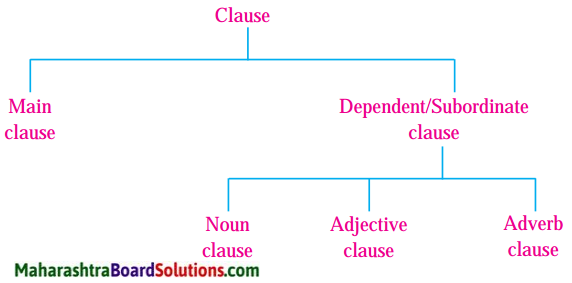
How do we decide whether a clause is a noun clause, an adjective clause or an adverb clause? There is a simple rule – we can replace an adverb clause with an adverb, an adjective clause with an adjective and a noun clause with a noun.
Look at the following examples:
- But I don’t know the answer. (Noun)
But I don’t know what they want. (Noun clause) - He told us a funny story. (Adjective)
He told us a story that was funny. (Adjective clause) - They went away. (Adverb)
They went when you were talking to your friend. (Adverb clause)
Now complete the following on your own :
- But I don’t know ……………………………..
- He told us ………………………………………
- They went ………………………………………
![]()
8. Think before you use! Name some ‘ready to eat’ and ‘ready to cook’ food items available in the market. Discuss the following in groups.
Question 1.
Think before you use! Name some ‘ready to eat’ and ‘ready to cook’ food items available in the market. Discuss the following in groups.
(a) Discuss whether it is necessary to use such items and why they are sold.
(b) Discuss the possible adverse effects of such food items.
(Students may use the following points)
Food items: burger, pasta, pizza, hot-dog, soups, noodles, etc.
Answer:
(a) Points: not necessary to use-people use them for a matter of convenience – different tastes other than home food – office-going, working people’s need – young children’s craze, ready and easy to eat – many customers – good sell – good income for the manufacturers.
(b) Points: adverse effects: kidney failure, obesity, blood pressure, overweight, heart attack.
5. Activity: Live English: Packs, packets, pouches, wrappers
1. Activity: Live English : Packs, packets, pouches, wrappers
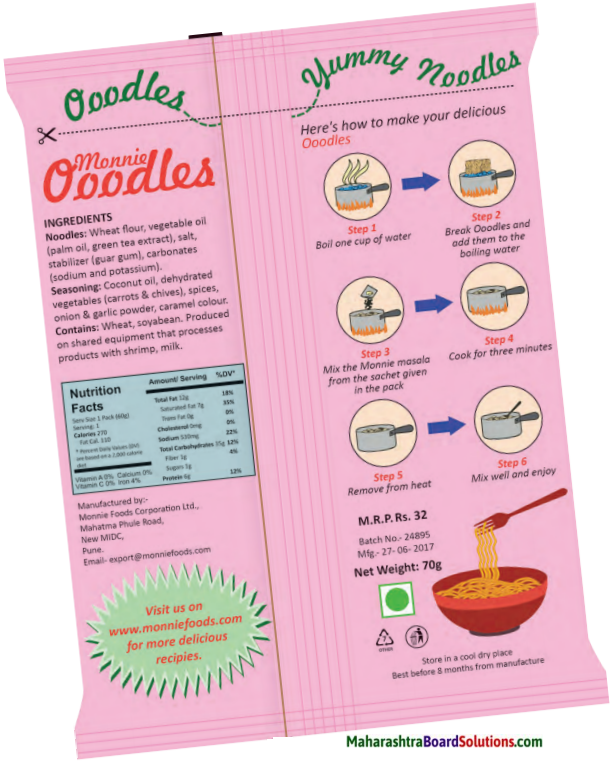
Question (a)
Given above is the picture of an imaginary food item’s packet. Let us see how to ‘read’ the matter on the packet as a vigilant consumer. Look at the wrapper and complete the sentences.
Answer:
- The name of the food item is noodles.
- It is made by Monnie Foods Corporation Ltd., Pune.
- It is a Veg food item. (Veg/Non-veg)

- The ingredients of noodles are wheat flour, vegetable oil, salt, carbonates.
- The date of packing is 27/6/2017 and the expiry date is not given.
- It should be consumed before 8 months from the date of manufacturing.
![]()
Question 1.
Try and obtain more information about the various symbols printed on the packet:
Answer:
![]()
2. Discuss the following with the help of given points:
Question 1.
Why the ‘recipe’ is given on the packet:
Answer:
Points: to prepare recipe fast in simple and enjoyable way/manner, proper additives, water, etc. to manage timing-preparing the food item in short time without confusion.
Question 2.
Why the packet tells us to visit the website of the company :
Answer:
Points: for complaining about the bad food product – to enquire about another food products of the company – to get more information about the food item in the packet.
Question 3.
What ideas are used to make the packet attractive :
Answer:
Points: well designed – illustrations for making recipe – separate tables for ingradients, Nutrition facts and recipe – beautiful attractive writing – clear instructions.
Question 4.
How you will verify whether something is good for you to eat:
Answer:
Points: after reading information on the packet especially about ingredients and nutrition facts taste after having the food item – from reliability and genuineness of the manufacturer – popularity.
![]()
Question (b)
Collect the outer coverings of fast food items. Discuss the following points in groups and then write your observations in your notebook.
Answer:
- ngredients
- Manufactured by
- Net weight
- Veg or Non-veg
- Recipe
- Nutrition facts
- MRP
- Mfg. date
- Website
- Other instructions, if any
Question (c)
Work in groups and prepare an attractive wrapper or packet for any product of your choice. Prepare an advertisement for your product.
Question (d)
You want to convince the customer to buy your product. Prepare a conversation between you and the customer about it.
Answer:
Convincing a customer about a product
- Myself: Welcome to our shop. How can I help you?
- Customer: I want some quality fast food. My daughter is craving for it since morning!
- Myself: No problem Sir. We have variety of food items in our shop. But I shall insist you to buy this ‘Mineral Noodles’.
- Customer: I haven’t heard about this.
- Myself: Don’t worry Sir. I won’t give you any ordinary product. It is new and has become a craze in the market.
- Customer: What is special about it?
- Myself: Yes, I tell you. It’s a purely vegetarian t food, rich with important ingredients, rarely found in other products.
- Customer: What about the taste?
- Myself : Quite yummy. Children are greedy for it.
- Customer: Are there any chemical additives?
- Myself: Not at all, every ingredient is natural, healthy and nutritious. No complaint this date! Its recipe is simple, easy and can be prepared in five minutes. This will be your best choice. You won’t repent, and see the price – less than any renowned products. You must buy it. Customer: I believe your words. Pack me three packets of ‘Mineral Noodles’.
- Myself: Here they are!
- Customer: Thank you.
- Myself: Welcome, Sir.
![]()
Question (e)
Your younger sister wants to eat something tasty. You are telling her the recipe of one such food item. Prepare a dialogue about
Answer:
An Instant Recipe
(My younger sister comes to my study room asking for something to eat, since Mom isn’t at home.)
- Sister: Dada! I am really hungry. Can you help me make something tasty? Mother isn’t at home.
- Myself: I am studying right now, sis! But I surely can tell you a recipe that will delight your taste buds as well as fill your stomach.
- Sister: Thank you, Dada. So what I need to do. What will be the ingredients?
- Myself: Nothing fancy! You need a salty, crispy biscuit packet and slices of cheese and tomato ketchup.
- Sister: Here are them all. Anything else.
- Myself: Nothing! Now take two biscuits and cut the slice of cheese according to the size of the biscuits.
- Sister: Like this, right?
- Myself: That’s good! Now place the cheese slice between two biscuits and dip in ketchup. Your tasty, crispy, tummy filling delight is ready.
- Sister: It is so simple! And that’s really delicious, Dada. I’ll make more of these and will arrange in this plate for me and you to enjoy. Thank you!
- Myself: It’s my pleasure!
My English Coursebook 9th Class Solutions Chapter 3.4 Think Before You Speak! Additional Important Questions and Answers
Simple Factual Activity:
Question 1.
Complete the following:
(Answers are directly given.)
Answer:
1. Harsh words are like scattered bits of paper carried away by the wind because it is very difficult
to take them back.
2. The young man said that he had spoken very harsh and unkind words to his friend and he was deeply hurt.
Question 2.
Who said to whom?
- “How can I make amends?”
- “Go out into the street and collect the bits of | paper.”
- “Write all the harsh things you said to him.”
- “Learn to think before you speak in anger.”
Answer:
- The young man said to his spiritual teacher.
- The teacher said to the young man.
- The teacher said to the young man.
- The teacher said to the young man.
![]()
Complex Factual Activities:
Question 1.
What does the narrator tell you about the two fences that you have to pass before speaking a word?
Answer:
The narrator tells us that if you have to speak even a single word, that word must pass through two fences (walls). The first one is of our two rows of the teeth and the second is of our two lips. Before a word can be spoken, it has to pass/ pierce through these two fences or walls. Therefore we must think carefully before we utter a word or speak something.
Question 2.
What were a wise man’s thoughts about our spoken word?
Answer:
The wise man thought that you are the slave of your spoken word. Once you have spoken a word you cannot get it back whatever you do. Therefore you must be careful about the word that you choose for speaking. Once the word has left your lips, you will not be able to get it back; you cannot take it back; you cannot change it or control it.
Question 3.
How did the spiritual teacher teach a lesson to the young man about his harsh and unkind words to his friend?
Answer:
The teacher gave the young man a sheet of paper and a pen and asked him to write down all the harsh, unkind words he had spoken to his friend. When he had written, the teacher asked him to tear up the sheet of paper into many small bits and throw them out of the window. As he did this he asked him to collect all the tiny bits of paper.
The young man tried his best but could not collect a single torn bit of paper because they were scattered far and wide. The teacher told the young man that the spoken words are like the bits of paper; they cannot be taken back and advised him to think before he spoke.
![]()
Activities based on vocabulary:
Question 1.
Write from the passage the words related to our body parts :
Answer:
mouth, ears, teeth, lips
Question 2.
Write four words that have ‘un-’ as prefix:
Example: unspoken
Answer:
unaware, uncertain, uncommon, unclean
Question 3.
Match the following words in column ‘A’ with their antonyms in column ‘B’:
| ‘A’ | ‘B’ |
| 1. harsh | (a) easy |
| 2. earlier | (b) narrow |
| 3. difficult | (c) soft |
| 4. wide | (d) later |
Answer:
| ‘A’ | ‘B’ |
| 1. harsh | (c) soft |
| 2. earlier | (d) later |
| 3. difficult | (a) easy |
| 4. wide | (b) narrow |
Question 4.
Write any four adverbs each with ‘-ly’ that express
(a) anger and
(b) loving nature in our talk:
Answer:
(a) anger: harshly, angrily, rudely, nastily
(b) loving nature: sweetly, nicely, affectionately, kindly
![]()
Activities based on contextual grammar:
Do as directed:
Question 1.
Complete the words by using correct letters:
- u _ ter
- thi_k
- mou _ h
- s_ave
Answer:
- utter
- think
- mouth
- slave
Question 2.
Copy the following sentences correctly in your notebook:
Answer:
1. “I am afraid I’ve lost my friendship with him. How can I make amends?”
2. “Throw the bits out of this window,” the teacher told him.
Question 3.
Put the following words in alphabetical order:
1. statesman, fence, nature, anger
2. stammer, scatter, spoken, statesman.
Answer:
1. anger, fence, nature, statesman.
2. scatter, spoken, stammer, statesman.
Question 4.
Punctuate the following sentences:
1. this is what happens with the spoken words the teacher said
2. now tear up this sheet of paper into as many as small bits as you can the wise teacher said
Answer:
1. “This is what happens with the spoken words,” the teacher said.
2. “Now tear up this sheet of paper into as many as small bits as you can,” the wise teacher said.
![]()
Question 5.
Write four small words (minimum 3 letters each) using the letters in the given word.
‘mythological’.
Answer:
- myth
- log
- logic
- toil.
Question 6.
Spot the error and rewrite the correct sentences:
1. The ears is like funnels, open all the time.
2. Therefore, learn to thought before you speak in anger.
Answer:
1. The ears are like funnels, open all the time.
2. Therefore, learn to think before you speak in anger.
Question 7.
Write related words as shown in the example:(Answers are directly given.)
Answer:

Question 8.
Complete the following word-chain of adjectives. Add four words, each beginning with the last letter of the previous word:
difficult → …………… → …………….. → …………….. → …………………
Answer:
difficult → talkative → energetic constant → tanned.
![]()
Question 9.
Make a meaningful sentence by using the following phrase in your own sentence.
“to be afraid of”.
Answer:
Nowadays children are not afraid of ghosts and stories of ghosts.
Question 10.
Use prefix to or suffix to make new words and use any of the roots words in your own sentence :
1. correct
2. complete
Answer:
1. incorrect
2. incomplete.
Sentence: There was a complete silence in the class.
Question 11.
Make the following sentence bigger by adding a clause:
My village is a beautiful place ………………….
Answer:
My village is a beautiful place which is situated very close to the Konkan coast.
Personal Response:
Question 1.
Was Disraeli trying to give a scientific reason? Was he only trying to give a message in lighthearted but effective way?
Answer:
Disraeli was not trying to give any scientific reason about man having two ears and one mouth. It was good for mankind. If man had two mouths and one ear he would have talked more and listened less and appearance of his face would have strangely changed. He wanted to give a lighthearted and playful message that man should talk less and listen more.
Question 2.
Write the biological reasons why man’s ears and mouth have developed the way they are now.
Answer:
Ears are sense organs that interpret sounds. Two ears will function better by capturing sounds from everywhere. Mouth is basically for feeding in all animals. It should be a single one. It then leads to food pipe to carry swallowed food inside the body. With a single mouth, feeding is easier. However, ears should be two to gather all sound signals.
![]()
Question 3.
What do you do when someone speaks to you angrily. Do you also speak angrily?
Answer:
When someone speaks to me angrily, I try to keep my calm because I know that angry words lead to quarrels and fights. Fire of anger always takes a bad turn and becomes worst. I at first try to pacify the person talking harshly to me or then keep quiet without speaking a word with him.
Read the passage on the textbook page no. 83 about Socrates’ wisdom and his three questions and answer the following questions:
Question 1.
Who was Socrates?
Answer:
Socrates was one of the wisest men of the ancient world.
Question 2.
Who were influenced by his teachings?
Answer:
Many youths were influenced by his teachings.
Question 3.
What did he advise his disciples?
Answer:
He advised his disciples to keep their mouth shut and speak only when it is absolutely necessary.
![]()
Question 4.
Have you ever passed on an empty remark or vain statement that might hurt someone else? What can you do to avoid doing it again ?
Answer:
I was very proud of my fair colour. Once I, jokingly, passed some nasty remark on one of my friends, about his dark colour. He was greatly hurt and stopped talking with me; he started avoiding me and our friendship was lost.
I realised that I shouldn’t have passed such a vain remark. I have now decided to avoid passing such remarks. I can avoid speaking without thinking. I can stop jeering at others. I can change my attitude and speak sweetly and kindly to everyone.
My English Coursebook 9th Class Solutions Unit 3

